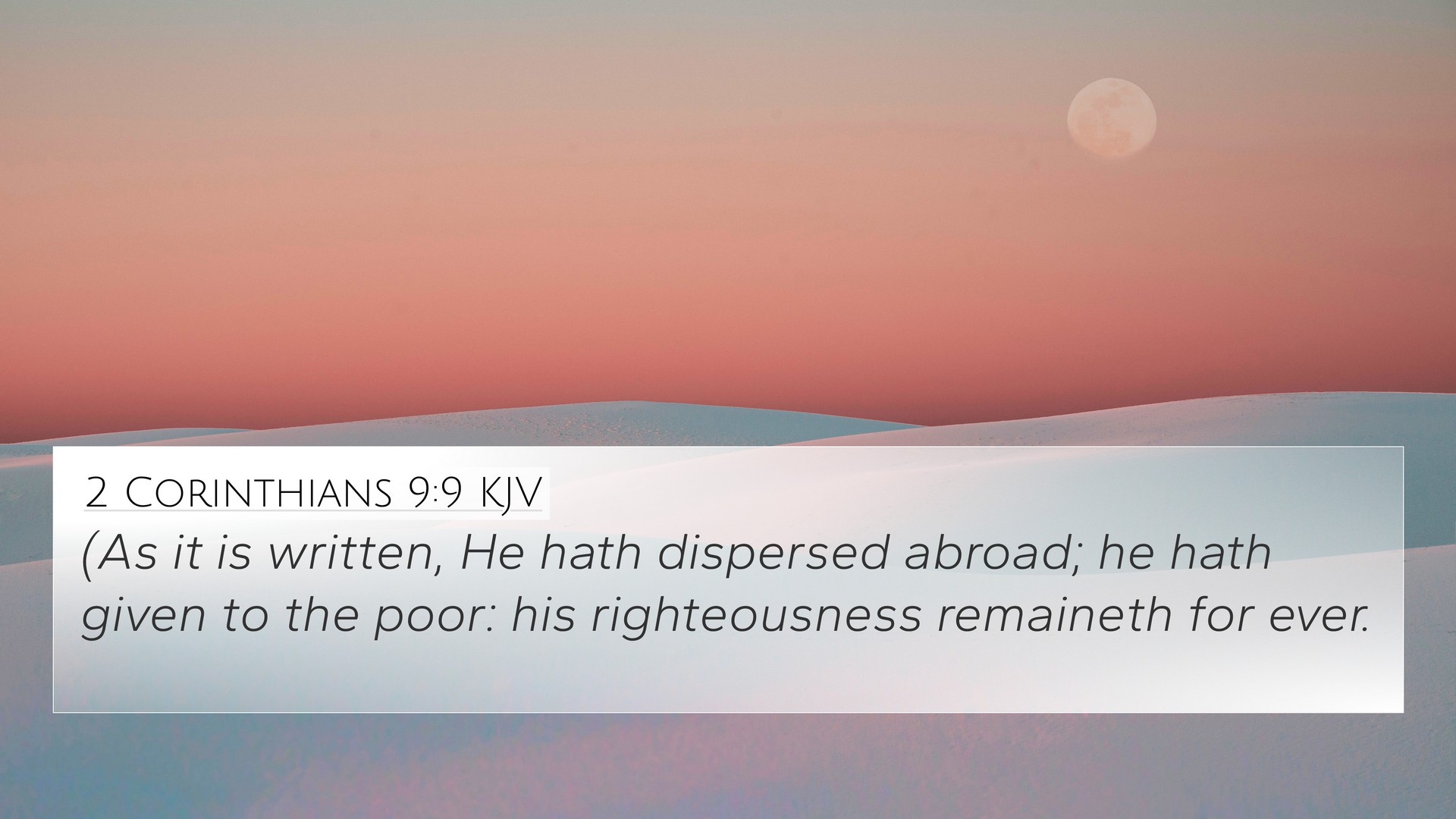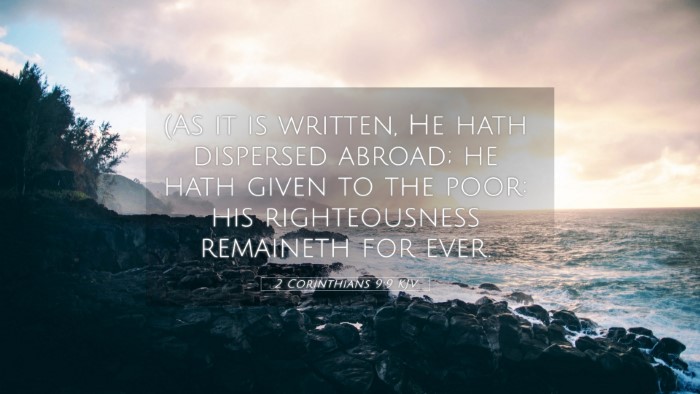Old Testament
Genesis Exodus Leviticus Numbers Deuteronomy Joshua Judges Ruth 1 Samuel 2 Samuel 1 Kings 2 Kings 1 Chronicles 2 Chronicles Ezra Nehemiah Esther Job Psalms Proverbs Ecclesiastes Song of Solomon Isaiah Jeremiah Lamentations Ezekiel Daniel Hosea Joel Amos Obadiah Jonah Micah Nahum Habakkuk Zephaniah Haggai Zechariah Malachi2 Corinthians 9:9 Similar Verses
2 Corinthians 9:9 Cross References
(As it is written, He hath dispersed abroad; he hath given to the poor: his righteousness remaineth for ever.
Uncover the Rich Themes and Topics of This Bible Verse
Listed below are the Bible themes associated with 2 Corinthians 9:9. We invite you to explore each theme to gain deeper insights into the Scriptures.
2 Corinthians 9:9 Cross Reference Verses
This section features a detailed cross-reference designed to enrich your understanding of the Scriptures. Below, you will find carefully selected verses that echo the themes and teachings related to 2 Corinthians 9:9 KJV. Click on any image to explore detailed analyses of related Bible verses and uncover deeper theological insights.
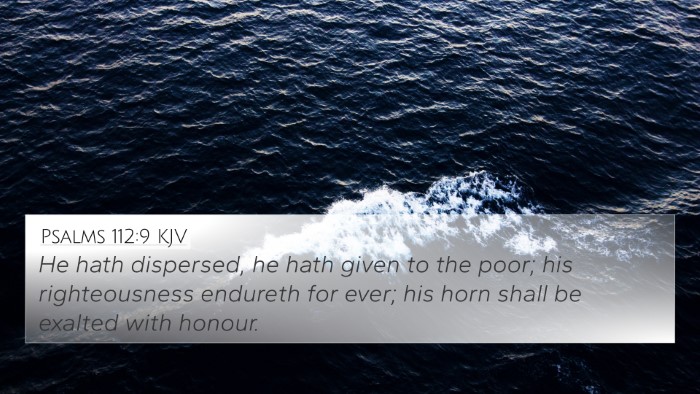
Psalms 112:9 (KJV) »
He hath dispersed, he hath given to the poor; his righteousness endureth for ever; his horn shall be exalted with honour.

Psalms 112:3 (KJV) »
Wealth and riches shall be in his house: and his righteousness endureth for ever.

Proverbs 21:21 (KJV) »
He that followeth after righteousness and mercy findeth life, righteousness, and honour.
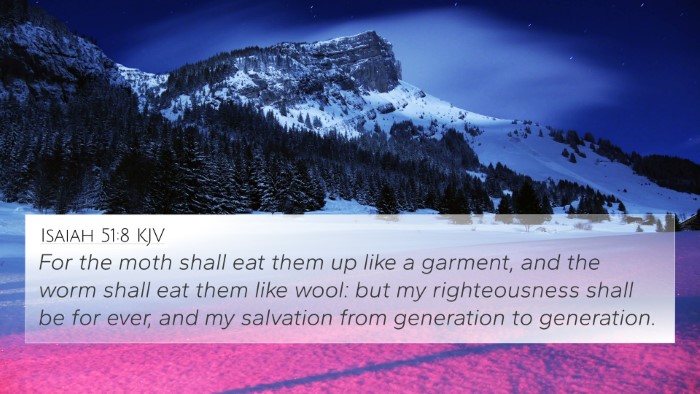
Isaiah 51:8 (KJV) »
For the moth shall eat them up like a garment, and the worm shall eat them like wool: but my righteousness shall be for ever, and my salvation from generation to generation.
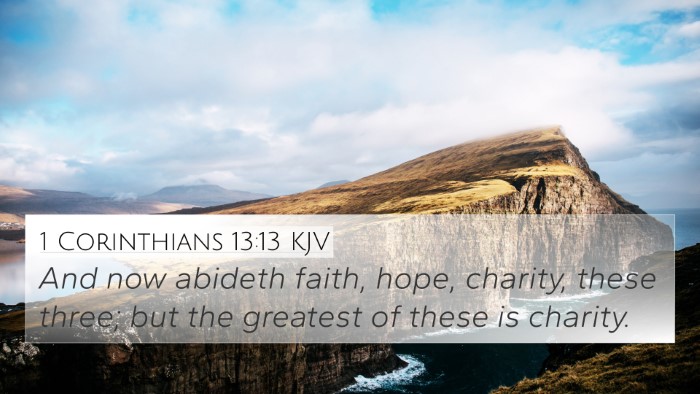
1 Corinthians 13:13 (KJV) »
And now abideth faith, hope, charity, these three; but the greatest of these is charity.
2 Corinthians 9:9 Verse Analysis and Similar Verses
Understanding 2 Corinthians 9:9
Verse: 2 Corinthians 9:9 states, "As it is written, He hath dispersed abroad; he hath given to the poor: his righteousness remaineth for ever." This verse underscores the principle that Godly giving is a reflection of one's character and leads to lasting righteousness.
Summary of Insights from Public Domain Commentaries
This verse draws from Psalms 112:9, focusing on the righteous individual's generosity. Matthew Henry notes that this scripture highlights God's provision for the needs of others through the generosity of His people. Albert Barnes emphasizes the permanence of the righteous man's legacy of kindness, indicating that good deeds have eternal value. Adam Clarke suggests that the act of giving is not merely a duty but an expression of a heart transformed by the grace of God.
Key Themes
- The Value of Generosity: The emphasis on giving reflects a deep-seated principle where the act of sharing leads to blessings not only for the recipient but also for the giver.
- Eternal Righteousness: The notion that righteousness, borne out of generous actions, remains eternal fosters an understanding that loving acts are part of one's legacy.
- Divine Provision: God provides for those who give to the poor, as illustrated by the teachings throughout both the Old and New Testaments.
Cross-References to Consider
- Psalms 112:9: “He hath dispersed, he hath given to the poor; his righteousness endureth for ever; his horn shall be exalted with honor.” This verse shows a direct parallel to the generosity described in 2 Corinthians 9:9.
- Proverbs 19:17: “He that hath pity upon the poor lendeth unto the Lord; and that which he hath given will he pay him again.” This emphasizes the reciprocal nature of giving.
- Luke 6:38: “Give, and it shall be given unto you; good measure, pressed down, and shaken together, and running over, shall men give into your bosom.” This connection reinforces the principle that giving leads to abundant blessings.
- Galatians 6:9: “And let us not be weary in well doing: for in due season we shall reap, if we faint not.” This aligns with the rewards discussed in 2 Corinthians 9:9 regarding the long-term effects of righteous actions.
- Matthew 6:20: “But lay up for yourselves treasures in heaven, where neither moth nor rust doth corrupt, and where thieves do not break through nor steal.” This verse links the earthly acts of generosity to heavenly rewards.
- 1 Timothy 6:18: “That they do good, that they be rich in good works, ready to distribute, willing to communicate.” This teaches believers about the active nature of generosity.
- James 1:27: “Pure religion and undefiled before God and the Father is this, To visit the fatherless and widows in their affliction, and to keep himself unspotted from the world.” This connects the act of caring for the needy with true faith.
- Philippians 4:19: “But my God shall supply all your need according to his riches in glory by Christ Jesus.” This reinforces God’s promise to provide for those who live generously and faithfully.
- Hebrews 13:16: “But to do good and to communicate forget not: for with such sacrifices God is well pleased.” This verse encapsulates God's pleasure in the selfless act of giving.
- 2 Corinthians 5:10: “For we must all appear before the judgment seat of Christ; that every one may receive the things done in his body, according to that he hath done, whether it be good or bad.” This underscores the accountability of one's deeds in the context of eternal rewards and consequences.
Thematic Connections
The themes of generosity and righteousness recurred throughout Scripture, presenting a comprehensive view of how believers are called to respond to both need and opportunity. The act of giving to the needy not only benefits the recipients but is also a reflection of God's character and provision in believers’ lives.
Conclusion
In conclusion, 2 Corinthians 9:9 serves as a powerful reminder of the eternal impact of our earthly actions, especially in the light of generosity. The connections found through cross-referencing other biblical texts enhance our understanding of this principle, providing a broader context for its meaning and significance in the life of a believer. By engaging in cross-referencing biblical texts and making thematic connections, believers can deepen their understanding of God's Word and its applications to their lives.
